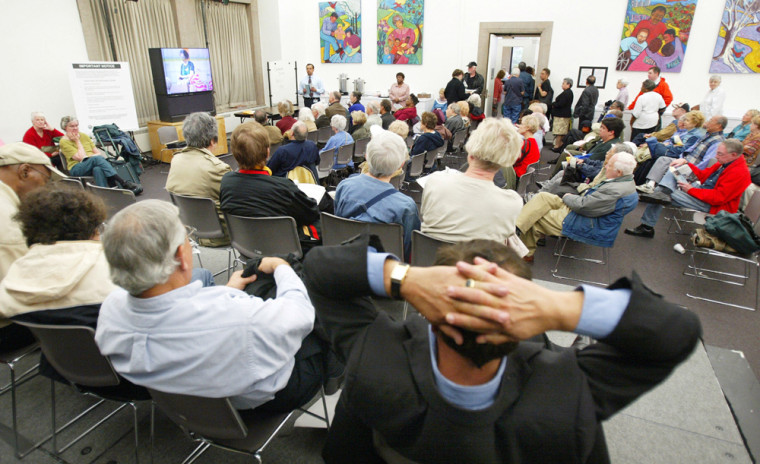Some say it is a huge waste of time. Others say it is schmaltzy, even insipid. Still others maintain that it is simply just another example of how to recycle the same old material again and again. What are they referring to? The latest Hugh Grant movie? The ninety-fourth installment of CSI? Donald Trump’s hair?
No! They are referring to my annual review of the biggest bioethics stories of the year.
But before I take you down memory lane, a few words are in order concerning the lively and supportive thoughts e-mailed to me by so many of my regular readers, an inordinate number of whom seem to be rabid ideologues and kooks -- otherwise known as my critics.

So, to those who e-mail me to drop dead after every column and who have been reminding me since November that Bush won, I, despite my liberal leanings, will not be following their advice and going to (a) Canada, (b) Cuba, (c) Russia, (d) bleepin France, or (e) hell.
Nor, my keenest admirers, will I be getting a gonad or brain transplant. And, despite your most fervent wishes, I don’t plan to shut up, fornicate with myself or die.
OK. Now that I have acknowledged the friendlier e-mailers of the past year, on to what really mattered, the bad and the good of 2004.
Ethical debacles
There were quite a number of contenders for biggest ethical debacle of the past year. The SNAFU created when a plant in Britain was taken off-line, leaving tens of millions of vulnerable Americans without a flu shot represented a distinctive low point in public-health ethics as some of our citizenry pushed ahead of others at malls, doctors’ offices and student health-care clinics in order to selfishly get vaccinated. Much the same bad behavior was on display as a few moral slugs jumped out of line to use billboards or the Internet to try to capture a transplantable organ for themselves.
The revelation that some scientists working at the National Institutes of Health had simultaneously been on the dole of the pharmaceutical industry to the tune of hundreds of thousands of dollars per scientist was a very strong contender for worst ethical news of the year in biomedicine. The admission that medical people were involved in the torture of prisoners at Abu Ghraib was right up there as well. A Dutch hospital announced "guidelines" for pediatric euthanasia while Florida courts allowed the battle over the fate of Terri Schiavo to go on and on.
But my candidate for moral failure of the year was the inability of any politician to engage in serious discussion of how to fix our manifestly broken and dying health-care system.
Have you spent any time at a hospital ER lately? Waits of seven, eight or nine hours are not uncommon. US Airways' baggage service is faster. Administrators spend hours haggling with managed-care officials, almost none of whom are physicians, over who is approved to be seen where and by whom for how long. And those are the lucky ones since they have some form of health insurance. Tens of millions of us, including many children, don’t.
Doctors have no time to talk to anyone including their patients. The standards of cleanliness accepted as adequate at many hospitals would make someone from impoverished nations such as Bangladesh or Bolivia feel right at home. Rates of errors and a lack of meaningful data about the effectiveness of nearly every aspect of health care leave patients vulnerable and clueless. And things are worse, if you can believe it, when the patient is asked to become involved in clinical research. As we saw during the past year there is no assurance that the information learned in research will be made public, that adverse events will be noted much less systematically reported or that subjects who are hurt will be made whole.
Our health-care system is in worse shape than our airline industry but the airline industry is getting more press and one suspects more Congressional attention. Let’s hope that changes in the year ahead.
What went right
Now for some ethical good news. A 55-year-old woman helped her daughter have triplets using in vitro fertilization. Californians ended the debate about embryonic stem cell research by passing a referendum that put more money into this area than anyone could reasonably have hoped it might attract from any presidential administration. The United Nations wisely backed off passing a ban on all forms of cloning when some of the member states realized that they did not know exactly what they were being asked to ban. And the media, some attorneys general, some politicians and the public began to wonder how to fix the corrupt system of marketing that has been allowed to flourish for far too long between doctors, academic health centers and private pharmaceutical and biotech companies.
OK critics, you can still e-mail me if you somehow find fault with these selections.
Lastly, what would this exercise in the traditional trite New Year’s journalistic format be without a prediction or two for the year ahead?
Here are mine: the first face transplant will be attempted this year from a cadaver to a living person; prescription drug cards will be declared a disaster before the year is out; and the pharmaceutical industry will offer voluntary guidelines for reigning in direct-to-consumer advertising on television and radio.
Write 'em down and, as Cubs fans are wont to exclaim, wait until next year!
Arthur Caplan is director of the Center for Bioethics at the University of Pennsylvania.
